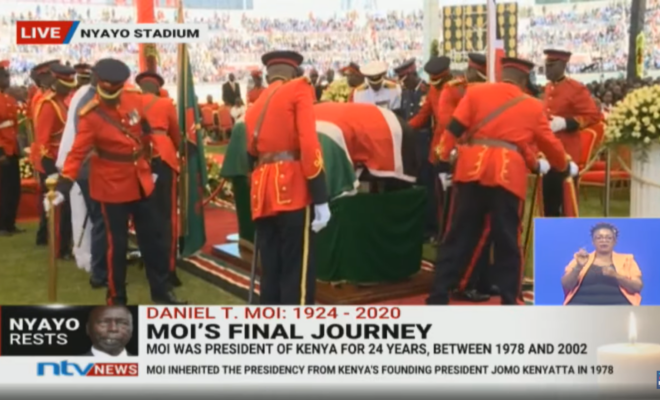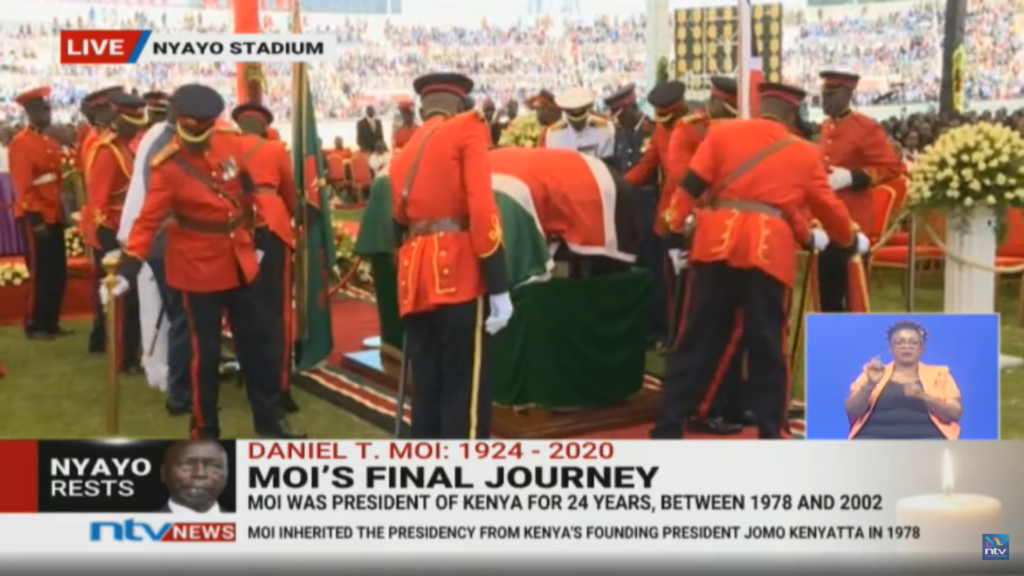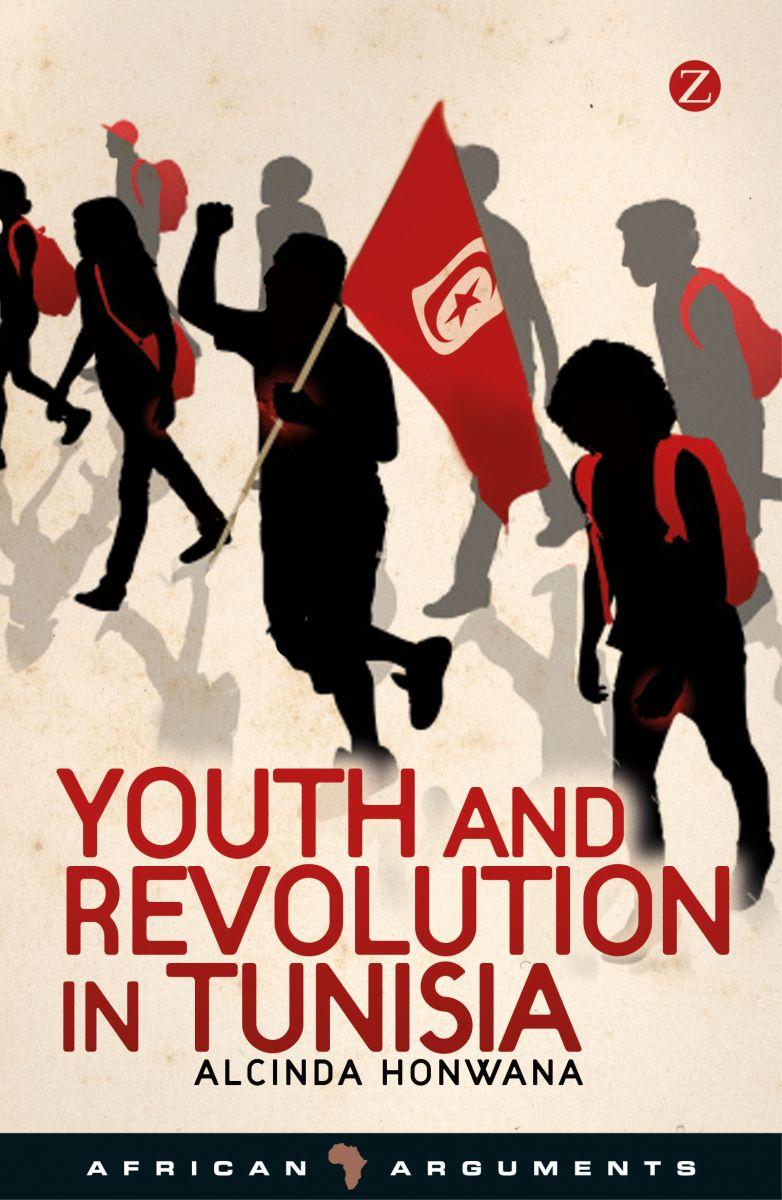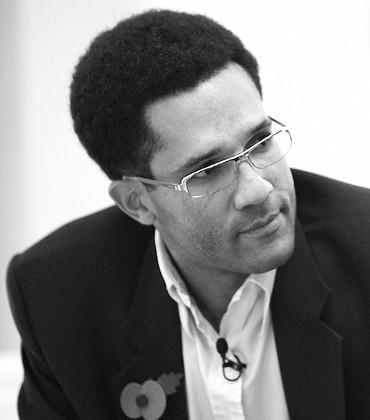The performance of mourning Moi

Before he died, he was a disgraced former dictator. Since he died, he’s been lionised as an iconic Kenyan hero. How did this happen?

A snapshot from NTV’s coverage of Daniel arap Moi’s funeral on 11 February.
On the morning of 4 February, President Uhuru Kenyatta issued a Presidential Proclamation announcing the death of Daniel arap Moi. Kenya’s longest serving president, he announced, had passed away aged 95 at Nairobi Hospital.
To Uhuru, losing Moi (Kenya’s second president) was like losing his father (Kenya’s first president) all over again. And with good reason. Moi took over the presidency after Jomo Kenyatta’s death in 1978 and provided cover for the Kenyatta family’s vast estate throughout his subsequent 24-year reign. Moreover, Moi was personally responsible for Uhuru’s rapid political ascent. He gave the untested novice the chairmanship of the tourism board in 1999; nominated him to parliament and appointed him to the cabinet in 2001; and then ignored his party’s virulent protests to handpick him as his successor for the 2002 presidential elections. Though Uhuru lost that election, it was only thanks to Moi’s early benevolence that he won the presidency ten years later.
And so, Uhuru’s message to the country that morning was more than a terse “I-am-saddened-to-inform-you-of-the-old-man’s-demise”. It was a trumpeting testimonial of Moi as a world leader and “one of Africa’s greatest, a man who made his nation and the continent immeasurably better”.
This was squarely at odds with how many people saw Moi’s legacy. Indeed, the head-of-state left office as a hate figure of sorts. At his successor’s inauguration, which drew one of the largest crowds in Kenyan political history, members of the audience pelted him with mud, singing yote yawazekana bila Moi (“everything’s possible without Moi”). The former president sat quietly, subdued and humiliated, watching as those he’d once jailed took over. According to a Gallup poll at the time, Kenyans were the most optimistic people on earth. Kenya had turned a new leaf, or so we thought.
No one since then has disputed that Moi’s rule was straight out of a dictator’s handbook. He turned Kenya into a one party state in 1982 and presided over widely-documented human rights abuses, political assassinations and corruption. His regime set up a notorious torture chamber in the basement of the Nairobi provincial headquarters – allegedly with expertise from Nicolae Ceaușescu’s Romanian secret police – where dissidents were bludgeoned and locked up. No one would’ve imagined that Moi would be eulogised on his death.
And yet, on learning the news, Kenya’s ever-expedient political class and press followed Uhuru’s cue in lionising the deceased dictator. When the news broke on one morning TV show, an opposition MP guest urged everyone on set to observe a minute’s silence. Even once ardent Moi opponents were now crying a river. A few days later, on 8 February, the still grieving president addressed the country again with a message of condolences in which he asked, poignantly: “How do you mourn an iconic leader?”
In newsrooms, editors had answered by calling back their staff to produce special editions. One television anchor had started his broadcast by declaring: “Today Kenya, Africa and the World is mourning.” Formerly disgraced Moi apologists were suddenly rehabilitated, while any negative assessments were evaded as the former president’s sins became excusable footnotes. Moi acolytes were now preaching forgiveness. We were all human after all. The head of public service even called on Kenyans to plant a tree or do any other good deed in memoriam.
There were some even more peculiar scenes. During one broadcast on Nation TV (NTV), a journalist was caught laughing on air as the screen showed images of Moi’s remains. Trying to contain himself, he explained that he was giggling because his station had finally been able to get coverage over Moi’s funeral, the rights to which had previously been exclusively held by its Moi-owned rival, the Kenya Television Network (KTN). A day before Moi’s funeral at a Nairobi stadium – when it was also announced that the first 30,000 people to arrive at Moi’s Kabarak home for his burial would receive a loaf of bread and a bottle of soda – the government spokesman had barred all media houses apart from KTN and the struggling national broadcaster, the Kenya Broadcasting Corporation (KBC). The move was reversed following media uproar.
Owning the news, owning the narrative
The ownership of Kenya’s media houses could explain the way in which the country’s press responded to Moi’s death. The Moi-owned media house, The Standard Group – which boasts Kenya’s oldest and sometimes boldest newspaper, The Standard, as well as the country’s first privately owned TV station, KTN – dropped any pretensions of objectivity in its coverage. It pushed the a-nation-in-mourning narrative from the start, even while its senior managers were shown looking uncomfortable inside Moi’s living room as the bereaved family thanked them for their gushing coverage.
It was not just the Moi-owned network, however. One of Moi’s nephews is the part-owner of Radio Africa Group, another prominent radio and newspaper conglomerate. The Kenyattas are associated with Kenya’s only free daily newspaper, The People Daily, which has its own TV channel and popular Kikuyu radio station. The Aga Khan, a long term friend of the Mois and Kenyattas, owns Nation Media Group, the largest media player in Kenya and East Africa. It is little wonder then that even in death, Moi is capable of wielding industry-wide editorial clout.
Then again, maybe Moi isn’t a posthumous puppet master. It could simply be that editorial merchants actually believe Moi was never the high priest of corruption or the human rights abuser-in-chief he was portrayed as. Perhaps this was editorial discretion at work. In fact, in hindsight, this new view was already apparent in October 2019 when a senior editor in Kenya’s leading TV station, Citizen TV, mischievously tweeted praise for Moi, nostalgically referring to him as “a serious political adult” who “history will judge kindly”. The editor was trolled out of his mind. This led the editorial director of the Nation Media Group to come to his rescue the following morning in a column in the Daily Nation, launching a stinging attack on Kenyans who contested Moi’s sanitisation, labelling them “shallow and given to keeping with the herd”.
Since his passing, Moi’s reputation has been laundered by certain double-faced figures. But not everyone is buying into Kenya’s elite conspiracy. During the funeral service at the stadium, a lone protester tried interrupting Moi’s son’s speech. A dozen presidential security commandos gagged him and whisked him away. The public mood was also perhaps well summed at the funeral for 14 school children killed in a tragic stampede recently. When politicians invoked Moi’s death in their speeches, the public booed.






